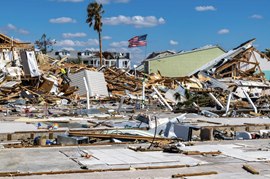Post-traumatic stress disorder is commonly associated with combat-related trauma, but service members may not know that PTSD can also be caused by experiences beyond the battlefield.
PTSD is a physical and mental reaction to a situation or event that was perceived as dangerous, according to behavioral health experts.
“The key is being exposed to a traumatic event,” said U.S. Air Force Col. Larry Kroll, deputy chief of the Defense Health Agency’s behavioral health clinical management team.
“Threatened death, actual or threatened serious injury, actual or threatened sexual violence—there are all kinds of traumatic experiences that qualify,” he said. These noncombat-related traumas include car accidents, mass shootings, natural disasters, physical, sexual, and emotional abuse.
 Mexico Beach, FL., Oct. 14, 2018--Hurricane Michael made landfall on the Florida Panhandle October 10th, with 155 mile-per-hour winds establishing it as the strongest storm to hit the continental U.S. since 2004. With winds as high as 155 mph, the Category 4 storm slammed coastal towns in the area, leveling buildings and structures, flooding streets and leaving a trail of destruction. Natural disasters can be triggers for post-traumatic stress syndrome, which are caused by noncombat and combat experiences. (Photo: Senior Airman Christian Clausen, Creech AFB)
Mexico Beach, FL., Oct. 14, 2018--Hurricane Michael made landfall on the Florida Panhandle October 10th, with 155 mile-per-hour winds establishing it as the strongest storm to hit the continental U.S. since 2004. With winds as high as 155 mph, the Category 4 storm slammed coastal towns in the area, leveling buildings and structures, flooding streets and leaving a trail of destruction. Natural disasters can be triggers for post-traumatic stress syndrome, which are caused by noncombat and combat experiences. (Photo: Senior Airman Christian Clausen, Creech AFB)
The PTSD trigger can vary from person to person. What is traumatic for one person may not be traumatic for another.
“A tornado comes and destroys the town you live in. Your neighbor's house is still standing. Yours is destroyed,” Kroll said. “Both parties could be diagnosed potentially with PTSD.”
The trigger may be through direct exposure to trauma, or even indirect exposure. According to Kroll, indirect exposure could range from situations like a first responder witnessing trauma as part of their job to learning that a relative or close friend was exposed to a trauma.
There are several symptoms that can lead to a PTSD diagnosis.
-
Re-living the event: Service members who experienced a traumatic event may re-live the event in their minds over and over again. They may have nightmares or flashbacks. Reminders of the trauma can be caused by people, places, sounds, and or smells. These reminders are called “triggers.”
- Avoiding situations that remind you of the event: Service members may avoid the things that remind them of the experience to avoid painful thoughts and feelings.
- Negative thoughts or feelings that worsen after the trauma: You may have changes in thoughts and moods after a trauma. You may blame yourself or feel guilty for having these thoughts. You may separate yourself from others, lose interest in things you like to do, and feel more and more isolated.
- Hyperarousal: You may feel too alert or hyper-aware of your surroundings. You may have trouble sleeping and concentrating. You may feel irritable, overly aggressive, or be easily startled.
It’s important to reach out for help if you experience PTSD symptoms. Treatments like cognitive processing therapy and prolonged exposure therapy are highly effective and available in most military hospitals and clinics. Newer treatments like eye movement desensitization and reprocessing therapy may help too.
According to Brandi Blue, a licensed clinical social worker at Nellis Air Force Base, Nevada, these therapies allow for the patient to process their feelings of distress and challenge any unrealistic thoughts that have come from the trauma.
Service members may have felt reluctant to get help in the past, but Blue said that education in schools and exposure to mental health needs and symptoms on social media, television, and in movies is lessening the stigma.
“We can help you manage it better and deal with it better,” said Kroll. “We just want you to have a better life and a more fulfilling life.”
Kroll sees a difference in younger service members. “I think young soldiers, sailors, marines, airmen, and guardians now are far more comfortable getting mental health support than service members were when I first came in… they’re more comfortable talking about their stuff.”
Resources:
The Military Health System has many resources available to help service members, families, or veterans, such as:
The Psychological Health Center of Excellence: The center seeks to improve lives of service members by advancing excellence in military psychological health care research.
Real Warriors Campaign: Real Warriors encourages members of the military community to seek help for mental health concerns by promoting a culture of support. The campaign features videos, tools, and resources with key information about mental health and how to get help.
inTransition: inTransition is a free, confidential program that offers specialized coaching and assistance for active duty service members, National Guard and Reserve, veterans, and retirees who need access to mental health care.
For a complete list of PTSD and mental health resources, visit the Health.mil information pages.